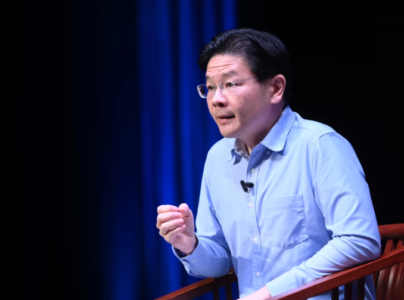As Singapore’s future leader, Wong must navigate complex global dynamics while maintaining harmony between major powers.
During his tenure, founding Prime Minister Lee Kuan Yew garnered respect from leaders in both the East and West. However, the man now poised to succeed him may encounter even greater challenges ahead.
Finance Minister Lawrence Wong, recently named as the head of the ruling People’s Action Party’s fourth generation of leaders (4G) and the anticipated successor to Lee Hsien Loong, faces the intricate task of maintaining strong relations with both China and the West.
A May 2 article in The Financial Times (FT) highlights the difficulties Mr. Wong is likely to confront as Singapore balances its position as the largest foreign investor from the United States while simultaneously counting China as its biggest trading partner.
Indeed, Mr. Wong has broached this topic, expressing concerns during a recent business conference about whether the world is becoming increasingly “divided” and “bifurcated” in the wake of Russia’s invasion of Ukraine.
He questioned, “Will we start to see… an erosion of the international, rules-based order that has enabled small countries like Singapore to thrive and prosper?”
The FT noted that while Mr. Wong openly acknowledges the escalating global tensions, he has also welcomed the U.S. proposal for an “economic framework” in the Indo-Pacific, suggesting that China could potentially join this initiative.
“We have entered a new era of greater contestation for influence between countries and blocks, which may erode the rules-based multilateral system that has been so crucial to Singapore’s success. In particular, the rivalry between the two great powers — the U.S. and China — has intensified, and will impact the world for the rest of the decade and more,” he stated.
The article emphasizes that navigating this dual allegiance could pose challenges for Mr. Wong domestically. A 2021 Pew Research Center study revealed that approximately 64% of Singaporeans hold a favorable view of China, significantly higher than the median of 27% among 17 advanced economies surveyed.
Moreover, the study indicated that Singapore is unique in that more citizens prefer close economic ties with China over the U.S. “We feel a certain sympathy, even empathy, for the Chinese. We no longer trust Western politicians. We no longer trust the Western media,” a former independent MP was quoted as saying in the FT.
The growing inequality in Singapore has also contributed to public dissatisfaction with the open market economy that Mr. Wong advocates. Hong Kong-based academic Donald Low remarked, “There is a significant overlap between those who are more skeptical of that Western world order and those who have not benefited much from globalization. Voters have a voice. Whether Singapore can strike this delicate balance remains to be seen.”
FT also noted that many Singaporeans still hope for a position of neutrality, aspiring to be friendly with all and an enemy to none. Former chief economist at the sovereign wealth fund GIC, Yeoh Lam Keong, expressed support for Singapore’s stance on Ukraine but questioned whether it was the wisest course of action.
He cautioned that Singapore could have faced severe consequences had it opposed Nazi Germany, asserting, “You have to think in the best interests of your country… For small nations, this is not a matter of choice; it is a matter of survival.”








